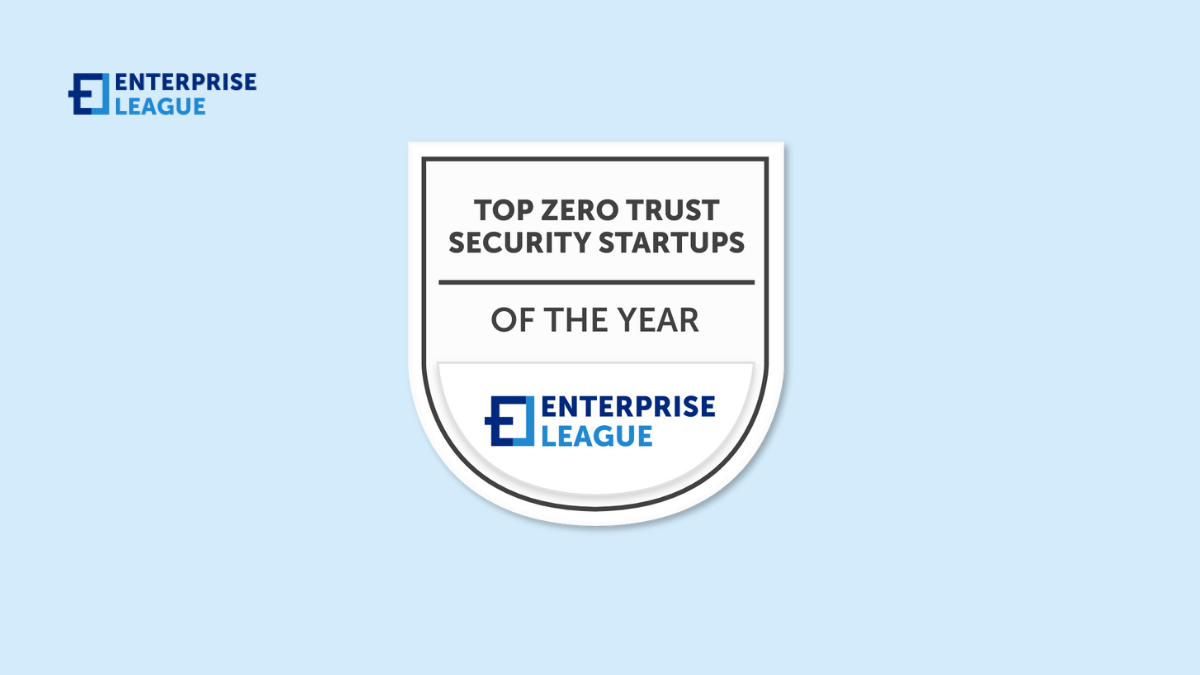22 zero trust security startups leading the security paradigm shift (2025)
October 29, 2024

With a market size predicted to reach USD 95.22 billion by 2030, zero-trust security startups are becoming the new darlings of investors and enterprises. Since cyberattacks are getting worse and remote work is becoming today’s norm, these startups are like superheroes for businesses.
Whether implementing a zero-trust framework or exploring other security measures, this modern approach helps companies protect themselves from data breaches and stay resilient against cyber threats no matter where their employees work or how attackers try to break in.
What are zero-trust security startups?
To break it down in a simpler way, think of zero-trust security startups as companies that create a new way of protecting your digital “house.” Instead of just having a strong front door, they’re like having a door to every room, and everyone needs to show their ID card before entering each room, every single time. This approach addresses business security risks by ensuring that even if an intruder manages to go past the initial defenses, they won’t be able to access sensitive data without proper authorization, which significantly boosts overall security.
Top zero-trust security startups
Complete list of the most zero-trust security startups that are worth knowing:
Authomize
Founded in 2019, Authomize is a cybersecurity company that helps protect organizations against hacking and breaches involving user identities. Their platform called ITDR gathers and standardizes identity data across an organization’s cloud services, apps, and identity access tools.
By centralizing identity information, Authomize can detect risky user activities, access issues, and policy violations. Their system establishes patterns for normal behavior so abnormalities stand out. Security teams can use Authomize to investigate problems like compromised accounts or data theft by tracing all user actions.
Airgap Networks
Founded in 2019, Airgap Networks is a cybersecurity company providing innovative “zero trust” technology to stop hackers from spreading inside computer systems. Their product, called Zero Trust Network Access Everywhere (ZTNae), takes a unique approach to secure businesses.
Airgap’s technology keeps adding advanced features for threat prevention and detection as hacking techniques evolve. Their innovation and fast implementation of comprehensive zero-trust security are gaining attention as high-profile breaches hit headlines. With an expanding customer base relying on their ZTNae platform, Airgap aims to revolutionize enterprise security from the inside out.
Elisity
Founded in 2018, Elisity is a cybersecurity company that offers a zero-trust access solution for businesses. Their product provides secure access control by using identity-based segmentation. This means access rights to sensitive data or systems are granted based on verifying each user’s identity and trust level.
The Elisity platform uses artificial intelligence to assess risk levels associated with different users and devices trying to access company resources. Their software acts like an intelligent gatekeeper, only letting in users who have verified identities and authorizations. Any suspicious or abnormal activity triggers alerts.
Mesh Security
Founded in 2021, Mesh Security offers a software platform to help businesses strengthen their cybersecurity using a “zero trust” approach. Zero trust means continually checking and confirming access instead of just letting users in once.
The Mesh platform acts as command central for applying zero-trust controls across all of a company’s security tools, apps, and cloud services. Regardless of the specific cybersecurity stack, Mesh gives unified visibility and control. Companies can implement consistent safeguards for maximum protection.
NXM Labs
Founded in 2016, NXM Labs focuses on “zero trust” cybersecurity for Internet of Things (IoT) devices and networks. Zero trust means never trusting a device or user in the system by default verification is always required. NXM offers security solutions to automate the protection of IoT networks scaling to thousands of devices.
Their technology can onboard new devices securely without needing to touch or configure each one individually. This “zero-touch” approach saves costs for large networks. NXM Labs solutions integrate identity management, encryption, and access policies to monitor all IoT activity for threats. Abnormal behavior triggers automated responses to prevent breaches.
Ory
Founded in 2019, Ory is a cybersecurity startup focused on zero-trust identity and access management. Their cloud platform called Ory Cloud helps companies control access to applications and data by verifying user identities. Ory uses open-source identity and authorization tools built on open standards to provide flexible security options. Companies can integrate Ory into their existing systems like cloud platforms and internal apps.
Once installed, Ory authenticates employee and customer identities before allowing access attempts. It checks multiple factors like passwords, fingerprints or security keys to verify users. Granular permission policies then authorize or restrict what verified users can access based on their roles.
Resiliant
Founded in 2019, Resiliant is a cybersecurity startup focused on digital identity and access management. Their main product is an identity and access system called ICAM powered by blockchain technology. At the core of Resiliant’s ICAM platform is their proprietary digital identity token called the IdNFT. It uses encryption on the blockchain to assign users a secure credential that proves their identity across systems and services. This allows passwordless authentication that is both convenient and more hack-proof.
The IdNFT acts like a digital passport allowing access only to appropriate accounts and data. Resiliant’s system integrates with existing IT infrastructure to strengthen identity policies and reduce risks. It provides a full audit trail showing who accessed what and when across an organization.
Surf Security
Founded in 2021, Surf Security developed a secure web browser based on chromium technology for safe browsing at organizations. Their zero-trust browser bolsters security by isolating and restricting website access to prevent attacks and data theft. Unlike VPNs that route traffic through a single tunnel, Surf sandboxed every tab and site into discrete microenvironments.
This containment means one compromised webpage can’t infect the browser or launch larger attacks. Granular controls neutralize threats while allowing normal browsing. The Surf browser also protects user privacy from prying employers. Browsing history, downloads, bookmarks, and other activities stay on the user’s device so staff can work freely without feeling monitored. Surf enables security policies while still ensuring personal privacy.
Tailscale
Founded in 2021, Tailscale is a company that offers secure networking software for businesses. Their goal is to connect devices remotely while protecting company data. Tailscale’s software uses WireGuard technology to create encrypted connections between devices – whether phones, laptops, or servers. This means employees can access internal systems no matter where they are. The software runs silently in the background to keep connections private.
Unlike virtual private network (VPN) tools, Tailscale doesn’t route all traffic. It only establishes secure links needed to access company tools and apps. This zero-trust approach limits access to verify what can connect.
TrueFort
Founded in 2015, TrueFort provides cybersecurity software to stop threats from spreading within networks and cloud environments. Their technology specifically blocks lateral movement which is when hackers infiltrate and then navigate internal systems to extract data or take control.
TrueFort Cloud secures cloud infrastructure and identities by preventing abuse of service accounts. These administrator-type logins manage servers and are often targets. TrueFort locks down credentials and entitlements to deny access propagation. They also sniff out suspicious internal activities like unusual user account access or application installs that signal an intruder.
Worldr
Founded in 2019, Worldr is a cybersecurity startup that develops zero-trust protection for messaging and collaboration platforms used by companies. Zero-trust means their products continuously check and authorize every access attempt rather than assume people or systems should automatically have entry.
Worldr’s security tools integrate seamlessly with apps like Slack or Zoom. Employees simply download a plugin to enable extra encryption, access controls, and monitoring that prevents data leakage. Behind the simple user experience is a complex security network that gives companies oversight similar to in-house applications.
Xage Security
Xage Security is a company that provides cybersecurity for industrial Internet-of-things (IoT) devices and systems. Their software focuses on a “zero trust” approach tailored to securing operational technology and IT infrastructure.
Operational technology refers to hardware and software running machinery, factories, energy utilities, and other industrial sites. Xage gives operators visibility and control to manage IoT and edge devices remotely. Their platform authenticates user access and communication between equipment using identity policies and encryption. This “zero trust” strategy locks down OT systems by default and grants the least privileged access to operate them.
Tigera
Founded in 2016, Tigera is a cybersecurity startup that helps businesses protect their cloud infrastructure that uses Kubernetes technology. Kubernetes helps companies manage and deploy cloud applications. Tigera offers cloud security tools tailored to Kubernetes environments deployed on public, private, or multi-cloud platforms. Their software integrates directly with Kubernetes to give users more control and visibility over security.
Tigera provides a zero-trust approach called “secure by default” that locks down cloud access and workloads. Their tools also automate security policies and compliance reporting. By integrating natively with Kubernetes, installation and management are simplified.
InfraOpS
Founded in 2017, InfraOpS is a cybersecurity startup that helps companies implement zero-trust network access without needing to overhaul their existing IT systems. Their product is a router and firewall solution that provides zero-trust capabilities to enable stronger security. The InfraOpS zero-trust router sits inside a company’s computer network to monitor all traffic flowing between users, servers, and applications. Their next-generation firewall software analyzes activity to identify suspicious access attempts that could indicate a breach.
Unlike traditional firewalls that blindly trust anyone already inside the network perimeter, InfraOpS takes a zero-trust approach – meaning no user or device is trusted by default, regardless of location. This stops attackers from exploiting blind spots to spread malware or steal data by questioning every network transaction.
VIBE Cybersecurity
Founded in 2024, VIBE Cybersecurity is a startup working on new encryption and authentication technology for better security in digital communications. They are developing an advanced system of protecting messages and data transfers without needing traditional digital certificates.
Their technology allows dynamic encryption keys to be exchanged without prior shared certificates to validate the keys – instead, the keys themselves have encrypted validation data embedded. This certificate-less approach speeds up secure connections since keys can be created on the fly without central certificate authorities.
Teleport
Founded in 2015, Teleport provides an open-source software platform that helps organizations manage access controls for their IT infrastructure, apps, and data stored in the cloud. Their platform acts as a single access gateway so security teams can easily audit and authorize usage across all computing resources.
In the past, maintaining consistent security standards and logging actions across in-house servers, multiple cloud accounts, and various applications could be a major challenge. Teleport consolidates identity and access management into one unified control panel for traditional and cloud IT resources. Using their software, IT admins can create and enforce access policies, monitor activity, and block unauthorized actions across all company systems from a single location.
BastionZero
Founded in 2017, BastionZero is a cybersecurity company that offers a secure remote access service for businesses. Their product Bastion provides a VPN gateway that protects access to a company’s servers, containers, and cloud infrastructure. The Bastion service features controls to prevent unauthorized logins even if credentials are compromised.
It includes SSH key management, integration with single sign-on systems, and the ability to automatically detect servers and assets that need protection. BastionZero tracks all sessions to detect attacks and attempted break-ins. The platform can block known hacker tools and tactics to stop intrusions. Detailed monitoring provides information to trace the source of any malicious access attempts.
Enclave Networks
Founded in 2020, Enclave Networks is a company that develops secure access solutions for businesses’ networks and devices. Their product provides “zero trust” access control that constantly checks identities and permissions before allowing connections. The Enclave platform automates setting up and managing private peer-to-peer networks within a company. These networks only allow access to pre-approved users and devices. Traffic flows directly device-to-device encrypted without routing through a central point.
This approach prevents unauthorized access or sniffing out devices to target. IT teams can instantly spin up new private networks with defined policies rather than managing rules firewall by firewall. Networks configure themselves based on the roles and requirements of the users and systems involved.
FileFlex
Founded in 2016, FileFlex is a secure file-sharing and collaboration service that allows users to easily manage, access, and control their files from anywhere. Created by software company Qnext, FileFlex lets people share documents and work together on projects with efficient features and tightened security.
Designed for robust enterprise information protection, FileFlex lets IT departments grant and monitor staff access. Audit logs track each user’s activity so security teams can watch for suspicious behavior. With robust controls suitable for regulated data plus easy collaboration tools workers already enjoy, FileFlex bridges convenience and compliance.
StrongDM
Founded in 2015, StrongDM offers a solution for securing access to sensitive data and systems called Continuous Zero Trust Authorization. This goes beyond regular access controls that just verify a user’s identity. It also checks the context of each access request to spot risky behaviors in real-time.
For example, StrongDM can notice if a database admin usually works from a particular office, but now tries to access payroll data remotely. Or if an engineer suddenly downloads terabytes of proprietary code. By tracking what is “normal” access and what’s suspicious, StrongDM can block potential threats while they happen.
OKTA Identity Cloud
Founded in 2009, OKTA offers a cloud service called Identity Cloud that helps companies manage user accounts and access. It comes in two main products – Customer Identity Cloud and Workforce Identity Cloud.
The Customer Identity Cloud handles user login for a company’s clients and website visitors. It allows secure access without complex passwords. The Workforce Identity Cloud does the same for employee accounts across all the apps and devices that a company’s team uses.
Both OKTA products create a single hub for identity management, applying consistent security policies across a business. Accounts stay synced as users move between devices, networks, and locations. Features like single sign-on and multi-factor authentication boost security with less hassle for users.
BeyondTrust
Founded in 1985, BeyondTrust is a cybersecurity company that provides various zero-trust security tools for access control and endpoint protection. Their products cover important parts of zero trust security, including identity management, privileged access, and endpoint protection.
However, BeyondTrust sells these as separate modules that each require their own purchase and deployment. Implementing their full suite of zero-trust offerings can get complex and costly compared to more integrated platforms.
Conclusion
As the market matures, we’re likely to see consolidation, with larger security vendors acquiring innovative startups to enhance their zero-trust capabilities. The startups that survive independently will be those that can scale effectively while continuing to innovate in areas like AI-driven threat detection, automated policy enforcement, and seamless integration with existing enterprise systems.
Discover more creative startups that might interest you:
- Top design startups investing in the future of design.
- Must-know edtech startups that spark curiosity and deepen understanding for learners.
- Amazing DTC startups improving your retail experience.
- Successful sheet metal companies with the smartest techniques of metal fabrication.
- Top media startups that are changing the way the media works in the online world.
Related Articles
10 business tips for beginners to help you build a healthy brand
Starting a business can be quite the challenge especially if you’re all new to entrepreneurship. These business tips for beginners will help you set off on the right foot.
SEO writing: Five foolproof tips to secure you the first page
When it comes to SEO writing it’s more guessing and less evidence about what works and what doesn’t. Luckily, we know what can really help you reach the first page.
How to onboard a new employee: Tips for quick integration
Your guide to smoother employee onboarding where you will find practical strategies that help new hires feel welcome and become productive team members faster.
10 business tips for beginners to help you build a healthy brand
Starting a business can be quite the challenge especially if you’re all new to entrepreneurship. These business tips for beginners will help you set off on the right foot.
SEO writing: Five foolproof tips to secure you the first page
When it comes to SEO writing it’s more guessing and less evidence about what works and what doesn’t. Luckily, we know what can really help you reach the first page.







